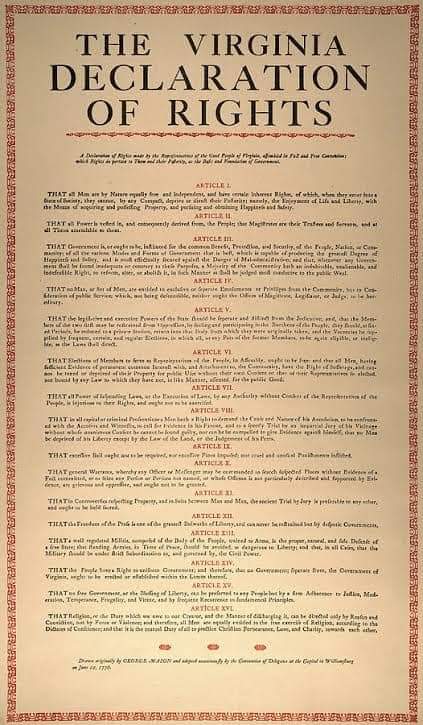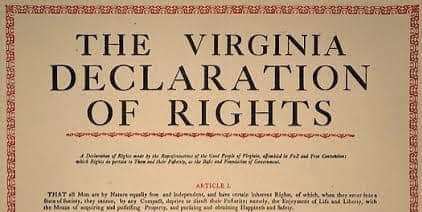1776년 6월 12일, 미국 버지니아의회에서 버지니아 권리 장전 (Virginia Bill of Rights) 채택
버지니아 권리 장전 (Virginia Bill of Rights)은 1776년에 초안을 잡은 영향력 있는 문서이며 ‘부당한’ 정부에 대한 반역의 권리를 포함한 인간에 내재하는 자연권을 선언한 것이다.
‘버지니아 권리 선언 (Virginia Declaration of Rights)’이라고도 불린다.
이 선언은 1776년 6월 12일 버지니아 의회에서 만장일치로 채택된 것이며, 6월 29일에 채택된 〈버지니아 헌법〉과는 다른 기술이다.
이후 버지니아 주 헌법 제1조로 편입되어 정리된 것이 버지니아 헌법에 들어가 있어 오늘날에도 법적으로 유효하다.
이 선언은 이후 많은 문서에 영향을 주었다. 예를 들어, 1776년 〈미국 독립 선언〉, 1789년 〈미국 권리 장전〉 및 1789년의 프랑스 혁명의 〈인간과 시민의 권리 선언〉을 들 수 있다.
버지니아 권리 장전은 당초 1776년 5월 20일 무렵부터 5월 26일 조지 매이슨이 기초하고, 이후 토마스 루드웰 리와 회의를 통해 정부를 만드는 권리를 가진 제 13절을 추가하여 수정되었다.
매이슨은 1689년 〈영국 권리 장전〉과 같은 이전에 있던 것으로 묘사된 시민의 권리에 따라 초안을 작성했고, 이 선언은 북아메리카 시민에게 처음으로 현대 헌법에서 개인의 권리를 보호한 것으로 생각된다.
영국 권리 장전에 씌여진 의회와 귀족원 의원과 같은 특권적 정치 계급이나 세습 직책 개념은 거부했다.
이 선언은 ‘정부의 근거와 근거로 … 버지니아 시민에 부수하는’ 권리를 주제로 16개 조로 구성되어 있다.
생명, 자유 및 재산의 자연권에 대한 고유의 성질을 확인한 것 외에도, 시민에 대한 종으로 정부의 개념에 대해 설명하고 또한 정부의 권한에 대한 각종 규제를 열거하고 있다.

- 모든 인간은 날 때부터 평등하게 자유롭고도 자주적이며 일정한 천부의 권리들을 갖고 있는 바, 인간들이 한 사회의 성원이 될 때, 예컨대 생명과 자유의 향유와 같은 그러한 권리를 후손들로부터 박탈할 수 없다. …
- 모든 권력은 인민에게 귀속되며, 따라서 인민으로부터 나오며, 그리고 행정 장관들은 인민들의 수탁자이자 종복이며…인민들에게 복종할 의무가 있다.
- 정부는 인민, 국가, 혹은 지역사회를 위한 공동의 편익과 보호와 안보를 위하여 제도화되며, 혹은 마땅히 제도화 되어야 하며, 그리고 어떠한 정부라도 부적절하거나 혹은 상기의 목적들에 위배될 때에는 그 공동체의 대다수 성원은 그들의 정부를 개혁하거나 개편하거나 폐기할 수 있는 권리를 가지며, 이 권리는 의심의 여지도 없고, 양도할 수 없고 무효화 할 수 없다. …
- 어떠한 인간이나 혹은 인간집단이나 그의 공동체로부터 독점적 혹은 별 도의 이득이나 특권을 받을 권리가 없다. 그러나 공공봉사에 대한 보수의 경우는 제외되나, 이 역시 그의 후손에게 물려줄 수는 없으며, 또 행정장관직이나 입법의원직이나 법관직도 세습되어서는 안 된다.
- 국가의 입법권과 행정권은 분립되어야 하고, 또 사법권과 구별되어야 한다. 그리고 입법부와 행정부 구성원들은 국민의 괴로움을 느끼고 체험함으로써 억압행위를 삼갈 수 있으며, 기간을 정하며 민간인의 지위로 되돌아가게 하여 그로 인한 공석이 정규적인 선거에 의해 충원되도록 해야 한다.
- 의회에서 국민대표로서 봉직할 사람들의 선거는 자유선거라야 하며, 모 든 인간은… 투표권을 가지며, 이들의 동의 없이는 이들에게 세금을 부과하거나 혹은 공용(公用)을 위해 그들의 재산을 이용할 수 없으며, 또한 이들이 동의하지 않은… 어떠한 법에 의해서도 구속 받을 수 없다.
- 법의 효력을 정지시키거나 법을 역행하는 모든 권력은 어떠한 당국이라 도 국민 대표들의 동의 없이 행사 할 때는 국민들의 권리를 해치는 것이며, 따라서 당연히 행사해서는 안 된다.
- 인간은 모든 사형선고나 사형선고를 받기 앞서 자기에 대한 고발의 이 유와 성격을 알리도록 요구할 권리가 있고, 고발자들과 증인들과 대면할 권리가 있고, 또 공평무사한 배심에 의한 신속한 재판을 받을 권리가 있으며, 이 배심원들의 만장일치의 동의 없이는 유죄로 판정할 수 없고 또 자신의 불리한 증거를 제시하도록 강제할 수도 없다. …
- 과도한 보석금을 의당 요구하지 말아야 하며, 또 과도한 벌과금도 부과 해서 안되고 또 잔인하고 기이한 벌도 주어서는 안 된다.
- 위법사실의 증거 없이 의심스러운 장소를 수색하거나 혹은 지명되지 않은 사 람이나 사람들을 체포하라는 명령이 적혀있는 일반 체포영장은 고통과 압박을 주는 것이며, 발부되지 않아야 한다.
- 인간 대 인간의 송사…에서는 배심에 의한 옛날식 재판이 다른 무엇보다도 바 람직하다.
- 언론의 자유는 위대한 자유의 보루 중 하나이며, 전제적인 정부가 아닌 이상 절대로 제한할 수 없다.
- 군사훈련을 받은 사람들로 구성된 규율 없는 국민군은 자유국가를 위한 적절하고, 자연스럽고, 안전한 방패이며… 어떠한 경우라도 군부는 문관의 권한에 … 엄격히 예속시켜야만 한다.
- 인민은 동일한 정부를 가질 권리가 있으며, 때문에 버지니아의 정부와 는 별도의 독립된 정부가 같은 정부테두리 안에 수립되거나 확립되어서는 안 된다.
- 어떠한 인민도 정의, 절제, 자제, 절약 및 덕행에 대한 확고한 신봉에 의해서만 자유정부 혹은 자유의 축복을 보전할 수 있다.
- 종교, 즉 우리가 우리의 창조주에 대한 의무과 그 의무를 이행하는 방 식은 오직 이성과 신념에 의해서만 지시될 수 있는 것이며 힘이나 폭력으로 지시될 수는 없다.

○ Virginia Bill of Rights (버지니아의 권리 장전) 원문
June 12, 1776
The Virginia Declaration of Rights
I. That all men are by nature equally free and independent, and have certain inherent rights, of which, when they enter into a state of society, they cannot, by any compact, deprive or divest their posterity; namely, the enjoyment of life and liberty, with the means of acquiring and possessing property, and pursuing and obtaining happiness and safety.
II. That all power is vested in, and consequently derived from, the people; that magistrates are their trustees and servants, and at all times amenable to them.
III. That government is, or ought to be, instituted for the common benefit, protection, and security of the people, nation or community; of all the various modes and forms of government that is best, which is capable of producing the greatest degree of happiness and safety and is most effectually secured against the danger of maladministration; and that, whenever any government shall be found inadequate or contrary to these purposes, a majority of the community hath an indubitable, unalienable, and indefeasible right to reform, alter or abolish it, in such manner as shall be judged most conducive to the public weal.
IV. That no man, or set of men, are entitled to exclusive or separate emoluments or privileges from the community, but in consideration of public services; which, not being descendible, neither ought the offices of magistrate, legislator, or judge be hereditary.
V. That the legislative and executive powers of the state should be separate and distinct from the judicative; and, that the members of the two first may be restrained from oppression by feeling and participating the burthens of the people, they should, at fixed periods, be reduced to a private station, return into that body from which they were originally taken, and the vacancies be supplied by frequent, certain, and regular elections in which all, or any part of the former members, to be again eligible, or ineligible, as the laws shall direct.
VI. That elections of members to serve as representatives of the people in assembly ought to be free; and that all men, having sufficient evidence of permanent common interest with, and attachment to, the community have the right of suffrage and cannot be taxed or deprived of their property for public uses without their own consent or that of their representatives so elected, nor bound by any law to which they have not, in like manner, assented, for the public good.
VII. That all power of suspending laws, or the execution of laws, by any authority without consent of the representatives of the people is injurious to their rights and ought not to be exercised.
VIII. That in all capital or criminal prosecutions a man hath a right to demand the cause and nature of his accusation to be confronted with the accusers and witnesses, to call for evidence in his favor, and to a speedy trial by an impartial jury of his vicinage, without whose unanimous consent he cannot be found guilty, nor can he be compelled to give evidence against himself; that no man be deprived of his liberty except by the law of the land or the judgement of his peers.
IX. That excessive bail ought not to be required, nor excessive fines imposed; nor cruel and unusual punishments inflicted.
X. That general warrants, whereby any officer or messenger may be commanded to search suspected places without evidence of a fact committed, or to seize any person or persons not named, or whose offense is not particularly described and supported by evidence, are grievous and oppressive and ought not to be granted.
XI. That in controversies respecting property and in suits between man and man, the ancient trial by jury is preferable to any other and ought to be held sacred.
XII. That the freedom of the press is one of the greatest bulwarks of liberty and can never be restrained but by despotic governments.
XIII. That a well regulated militia, composed of the body of the people, trained to arms, is the proper, natural, and safe defense of a free state; that standing armies, in time of peace, should be avoided as dangerous to liberty; and that, in all cases, the military should be under strict subordination to, and be governed by, the civil power.
XIV. That the people have a right to uniform government; and therefore, that no government separate from, or independent of, the government of Virginia, ought to be erected or established within the limits thereof.
XV. That no free government, or the blessings of liberty, can be preserved to any people but by a firm adherence to justice, moderation, temperance, frugality, and virtue and by frequent recurrence to fundamental principles.
XVI. That religion, or the duty which we owe to our Creator and the manner of discharging it, can be directed by reason and conviction, not by force or violence; and therefore, all men are equally entitled to the free exercise of religion, according to the dictates of conscience; and that it is the mutual duty of all to practice Christian forbearance, love, and charity towards each other.

참고 = 위키백과
크리스천라이프 편집부

